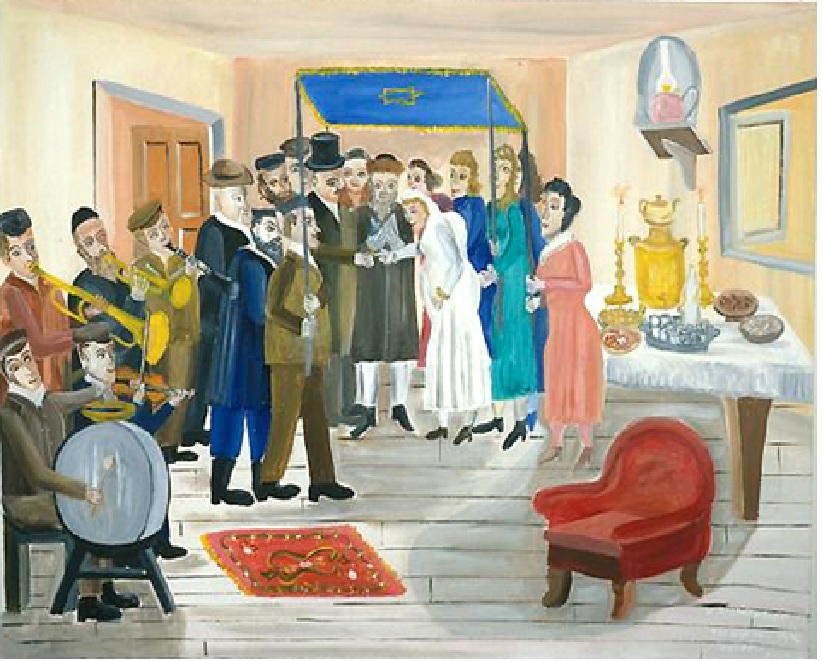Jewish life in Vilkaviskis under the Russian Rule
This material has been collected from personel memories and archival materials.
THE FAMILY
From the words of Harold Freed “Ours was a patricidal society. The man was the unquestionable head of the house, around which the household resolved. He was catered to both by his children and wife. Father entered the house and his entire household waited on him. I never recall my father ever attempting to pour a glass of tea for himself, mother generally anticipating his desires. Many shopkeepers, were running the entire business by themselves and were making a living for the family, thus allowing the man of the house leisure to attempt three services in the synagogue daily, besides taking part in the communal affairs, which was part of the process of storing up “wealth” for the hereafter. The Jewish male never had it so good. If the man was the king, the wife was the queen of the household. The relationship between wife and husband was very tender and though he was the master of the house he showed his wife all the respect due to a junior partner.”

“God could not be everywhere, so he created mothers.”
Yiddish Proverb
There is no question that in traditional Judaism, the primary role of a is as wife and mother, keeper of the household.
For the women in the shtetl there was no pause in the demand for their labor, no escape from the relentless grind of daily life. Regardless of class or even of individual temperament, the shtetl woman worked virtually nonstop, from early dawn until late at night.
No shtetl son or daughter could ever recall seeing their mother asleep. When the children went to bed their mother was still working; when they woke up in the morning, she was already at it again. Moshe Kaplan, describes , describes his mother’s daily routine:
“My mother was a housewife (for lack of a more accurate word) and she worked hard all her life.”
She got up at three o’clock in the morning to milk the cow and to take her to pasture with the shtetl’s communal herd. Then she stoked the fire in the oven, cooked, and baked bread, pastry, and donuts.
When she finished her household chores, she worked in the family vegetable garden consisting of about 2.5 acres in back of our home.”
The average shtetl woman raised between ten and twelve children, cared for aging parents and other relatives,. The businesses of many of them were located in the home, which may have been convenient in some ways, but also contributed to the overcrowding that was so common in shtetl households.

Father
Mother

When a son reached age three, his father wrapped him in a prayer shawl covering his face to create an element of mystery. Thus, the father carried his son into the esteemed kheyder [religious elementary school for Jewish boys]. Here the teacher ceremoniously started him immediately on his alefbeyz . . . [Hebrew letters]. The teacher said little boy, this is alef [letter A], this is a beyz [letter B], and so on. The teacher enticed the student by promising, ―If you say your alef, beyz [letters] correctly, an angel will throw you sweets. Lo and behold, sweets suddenly landed on the alef, beyz page.
When the sweets lost their enchantment for the little boy, the angel dropped a shiny kopeyke [Russian copper coin] as the boy studied his grammar. Sometimes the letters were covered with sweet tasting honey. Children studied in the kheyder to learn to read and write the Hebrew alphabet. Then they studied from nine in the morning until nine at night, studying the Bible and Talmud. At age 10, they learned to write Yiddish.
Sons
Daughters
Girls were not given a strenuous traditional Hebrew education. If a girl went to a girls‘ kheyder for a semester or two and knew her prayers and how to write a few lines, that was considered sufficient
VILKAVISKIS
A small town in Southern Lithuania
Where the Jewish Community is no more
This site was built by Ralph Salinger of Kfar Ruppin, Israel
It is built to the glory of the Jewish Community of Vilkaviskis
You can contact me with any comments at salinger@kfar-ruppin.org,il







